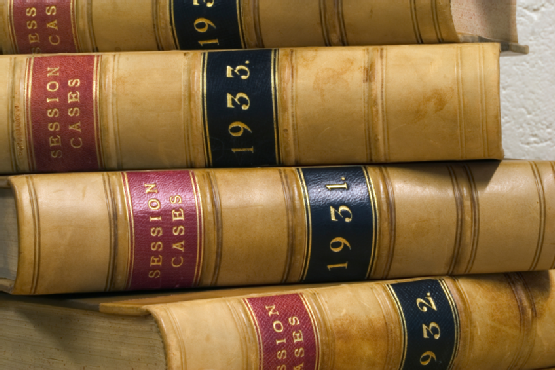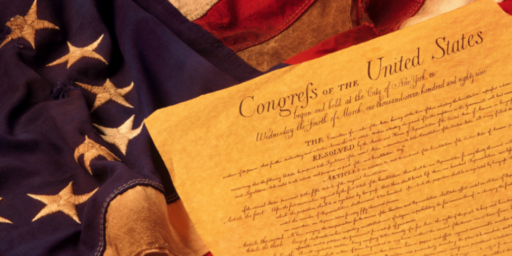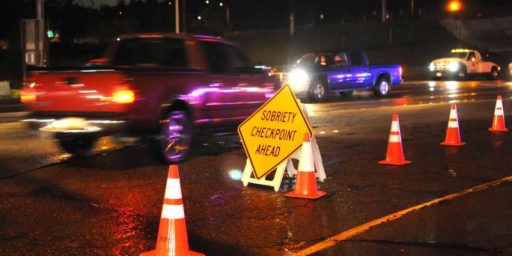Supreme Court to Rule on Cellphone Searches
The Justice Department thinks police should be able to search the smart phones of anyone arrested for anything.
The Justice Department thinks police should be able to search the smartphones of anyone arrested for anything.
NYT (“Supreme Court Taking Up Police Searches of Data Troves Known as Cellphones“):
In a major test of how to interpret the Fourth Amendment in the digital age, the Supreme Court on Tuesday will consider two cases about whether the police need warrants to search the cellphones of the people they arrest.
“The implications of these cases are huge,” said Orin S. Kerr, a law professor at George Washington University, noting that about 12 million people are arrested every year, often for minor offenses, and that about 90 percent of Americans have cellphones.
The justices will have to decide how to apply an 18th-century phrase — the Fourth Amendment’s prohibition of “unreasonable searches and seizures” — to devices that can contain 100 times more information than is in the Library of Congress’s 72,000-page collection of James Madison’s papers.
The courts have long allowed warrantless searches in connection with arrests, saying they are justified by the need to protect police officers and to prevent the destruction of evidence. The Justice Department, in its Supreme Court briefs, said the old rule should apply to the new devices.
Others say there must be a different standard because of the sheer amount of data on and available through cellphones. In February, for instance, the Texas Court of Criminal Appeals suppressed evidence found on the phone of a high school student who was arrested on charges of causing a disturbance on a school bus. “Searching a person’s cellphone,” the court said, “is like searching his home desk, computer, bank vault and medicine cabinet all at once.”
The justices are not always savvy about technology. At last week’s argumentover whether an Internet streaming service is lawful, Justice Antonin Scalia seemed to think HBO is a broadcast rather than a cable channel.
But the justices can be sensitive to the implications of new technology for privacy rights, especially their own. Things did not go well for the Justice Department after one of its lawyers said at a 2011 argument that the F.B.I. was free to place GPS devices on the justices’ cars. The government lost the case, against a drug dealer it had tracked for a month, by a 9-to-0 vote.
Similarly, in 2001, the court limited the use of thermal-imaging devices to peer into homes. Justice Scalia, writing for the majority, said, “It would be foolish to contend that the degree of privacy secured to citizens by the Fourth Amendment has been entirely unaffected by the advance of technology.”
The problem in the thermal-imaging case, he wrote, was that the devices could detect not only heat lamps used to grow marijuana but also “at what hour each night the lady of the house takes her daily sauna and bath.”
Searches of phones may give rise to a similar protective reaction. “It’s a technology that all the justices will understand,” Professor Kerr said. “They all have cellphones.”
But they may not know how much information such phones can contain, including call records, messages, Internet browsing records, calendars, books, diaries, photographs and videos, to say nothing of applications that connect to financial, medical and travel records.
Adam M. Gershowitz, a professor at William & Mary Law School, noted that his iPhone tracked and stored his movements. “I just looked,” he said, “and my phone shows that I arrived at work yesterday at 8:56 a.m.” It also showed where and when he had lunch.
Cell phones are not a weapon; they surely pose no safety risk to the arresting officer that would justify a search. The “destruction of evidence,” though, might reasonably be related to a traffic stop. The phone would provide evidence, for example, as to whether the person was texting while driving.
One might think the combination of one’s 4th Amendment right against unreasonable searches and one’s 5th Amendment rights against self-incrimination would be sufficient to protect the citizen from such an intrusive search. But that presumption flows from a common-sense reading of the Bill of Rights, not the case law.
The Supreme Court has all but eliminated our 4th Amendment rights, construing them as narrowly as possible. In particular, SCOTUS has bent over backward to side with police over citizens in cases involving search incident to arrest. FindLaw‘s indispensable Annotated Constitution:
The common-law rule permitting searches of the person of an arrestee as an incident to the arrest has occasioned little controversy in the Court. 35 The dispute has centered around the scope of the search. Since it was the stated general rule that the scope of a warrantless search must be strictly tied to and justified by the circumstances which rendered its justification permissible, and since it was the rule that the justification of a search of the arrestee was to prevent destruction of evidence and to prevent access to a weapon, 36 it was argued to the court that a search of the person of the defendant arrested for a traffic offense, which discovered heroin in a crumpled cigarette package, was impermissible, inasmuch as there could have been no destructible evidence relating to the offense for which he was arrested and no weapon could have been concealed in the cigarette package. The Court rejected this argument, ruling that ”no additional justification” is required for a custodial arrest of a suspect based on probable cause. 37
However, the Justices have long found themselves embroiled in argument about the scope of the search incident to arrest as it extends beyond the person to the area in which the person is arrested, most commonly either his premises or his vehicle. Certain early cases went both ways on the basis of some fine distinctions,38 but in Harris v. United States, 39 the Court approved a search of a four-room apartment pursuant to an arrest under warrant for one crime and in which the search turned up evidence of another crime. A year later, in Trupiano v. United States, 40 a raid on a distillery resulted in the arrest of a man found on the premises and a seizure of the equipment; the Court reversed the conviction because the officers had had time to obtain a search warrant and had not done so. ”A search or seizure without a warrant as an incident to a lawful arrest has always been considered to be a strictly limited right. It grows out of the inherent necessities of the situation at the time of the arrest. But there must be something more in the way of necessity than merely a lawful arrest.” 41 This decision was overruled in United States v. Rabinowitz, 42 in which officers arrested defendant in his one-room office pursuant to an arrest warrant and proceeded to search the room completely. The Court observed that the issue was not whether the officers had the time and opportunity to obtain a search warrant but whether the search incident to arrest was reasonable. Though Rabinowitz referred to searches of the area within the arrestee’s ”immediate control,” 43 it provided no standard by which this area was to be determined, and extensive searches were permitted under the rule. 44
In Chimel v. California, 45 however, a narrower view was asserted, the primacy of warrants was again emphasized, and a standard by which the scope of searches pursuant to arrest could be ascertained was set out. ”When an arrest is made, it is reasonable for the arresting officer to search the person arrested in order to remove any weapons that the latter might seek to use in order to resist arrest or effect his escape. Otherwise, the officer’s safety might well be endangered, and the arrest itself frustrated. In addition, it is entirely reasonable for the arresting officer to search for and seize any evidence on the arrestee’s person in order to prevent its concealment or destruction. And the area into which an arrestee might reach in order to grab a weapon or evidentiary items must, of course, be governed by a like rule. A gun on a table or in a drawer in front of one who is arrested can be as dangerous to the arresting officer as one concealed in the clothing of the person arrested. There is ample justification, therefore, for a search of the arrestee’s person and the area ‘within his immediate control’–construing that phrase to mean the area from within which he might gain possession of a weapon or destructible evidence.
”There is no comparable justification, however, for routinely searching any room other than that in which an arrest occurs–or, for that matter, for searching through all the desk drawers or other closed or concealed areas in that room itself. Such searches, in the absence of well-recognized exceptions, may be made only under the authority of a search warrant.” 46
Although the viability of Chimel had been in doubt for some time as the Court refined and applied its analysis of reasonable and justifiable expectations of privacy, 47 it has in some but not all contexts survived the changed rationale. Thus, in Mincey v. Arizona, 48 the Court rejected a state effort to create a ”homicide-scene” exception for a warrantless search of an entire apartment extending over four days. The occupant had been arrested and removed and it was true, the Court observed, that a person legally taken into custody has a lessened right of privacy in his person, but he does not have a lessened right of privacy in his entire house. And, in United States v. Chadwick, 49 emphasizing a person’s reasonable expectation of privacy in his luggage or other baggage, the Court held that, once police have arrested and immobilized a suspect, validly seized bags are not subject to search without a warrant. 50 Police may, however, in the course of jailing an arrested suspect conduct an inventory search of the individual’s personal effects, including the contents of a shoulder bag, since ”the scope of a station-house search may in some circumstances be even greater than those supporting a search immediately following arrest.” 51
Still purporting to reaffirm Chimel, the Court in New York v. Belton 52 held that police officers who had made a valid arrest of the occupant of a vehicle could make a contemporaneous search of the entire passenger compartment of the automobile, including containers found therein. Believing that a fairly simple rule understandable to authorities in the field was desirable, the Court ruled ”that articles inside the relatively narrow compass of the passenger compartment of an automobile are in fact generally, if not inevitably, within ‘the area into which an arrestee might reach in order to grab a weapon or evidentiary ite[m].”’ 53
Chimel has, however, been qualified by another consideration. Not only may officers search areas within the arrestee’s immediate control in order to alleviate any threat posed by the arrestee, but they may extend that search if there may be a threat posed by ”unseen third parties in the house.” A ”protective sweep” of the entire premises (including an arrestee’s home) may be undertaken on less than probable cause if officers have a ”reasonable belief,” based on ”articulable facts,” that the area to be swept may harbor an individual posing a danger to those on the arrest scene. 54
So, basically, citizens have to give up their rights in order to protect stupid, untrained officers from confusion. It’s even worse in the case of searches in connection with motor vehicles:
In the early days of the automobile the Court created an exception for searches of vehicles, holding in Carroll v. United States 55 that vehicles may be searched without warrants if the officer undertaking the search has probable cause to believe that the vehicle contains contraband. The Court explained that the mobility of vehicles would allow them to be quickly moved from the jurisdiction if time were taken to obtain a warrant. 56
Initially the Court limited Carroll’s reach, holding impermissible the warrantless seizure of a parked automobile merely because it is movable, and indicating that vehicles may be stopped only while moving or reasonably contemporaneously with movement. 57 Also, the Court ruled that the search must be reasonably contemporaneous with the stop, so that it was not permissible to remove the vehicle to the stationhouse for a warrantless search at the convenience of the police. 58
The Court next developed a reduced privacy rationale to supplement the mobility rationale, explaining that ”the configuration, use, and regulation of automobiles often may dilute the reasonable expectation of privacy that exists with respect to differently situated property.” 59 ”’One has a lesser expectation of privacy in a motor vehicle because its function is transportation and it seldom serves as one’s residence or as the repository of personal effects. . . . It travels public thoroughfares where both its occupants and its contents are in plain view.”’ 60 While motor homes do serve as residences and as repositories for personal effects, and while their contents are often shielded from public view, the Court extended the automobile exception to them as well, holding that there is a diminished expectation of privacy in a mobile home parked in a parking lot and licensed for vehicular travel, hence ”readily mobile.” 61
The reduced expectancy concept has broadened police powers to conduct automobile searches without warrants, but they still must have probable cause to search a vehicle 62 and they may not make random stops of vehicles on the roads, but instead must base stops of individual vehicles on probable cause or some ”articulable and reasonable suspicion” Supp.5 of traffic or safety violation orsome other criminal activity.Supp.6 By contrast, fixed-checkpoint stops in the absence of any individualized suspicion have been upheld.64 Once police have validly stopped a vehicle, they may also, based on articulable facts warranting a reasonable belief that weapons may be present, conduct a Terry-type protective search of those portions of the passenger compartment in which a weapon could be placed or hidden. 65 And, in the absence of such reasonable suspicion as to weapons, police may seize contraband and suspicious items ”in plain view” inside the passenger compartment. 66
Once police have probable cause to believe there is contraband in a vehicle, they may remove it from the scene to the stationhouse in order to conduct a search, without thereby being required to obtain a warrant. ”[T]he justification to conduct such a warrantless search does not vanish once the car has been immobilized; nor does it depend upon a reviewing court’s assessment of the likelihood in each particular case that the car would have been driven away, or that its contents would have been tampered with, during the period required for the police to obtain a warrant.” 67 The Justices were evenly divided, however, on the propriety of warrantless seizure of an arrestee’s automobile from a public parking lot several hours after his arrest, its transportation to a police impoundment lot, and the taking of tire casts and exterior paint scrapings. 68Because of the lessened expectation of privacy, inventory searches of impounded automobiles are justifiable in order to protect public safety and the owner’s property, and any evidence of criminal activity discovered in the course of the inventories is admissible in court. 69
It is not lawful for the police in undertaking a warrantless search of an automobile to extend the search to the passengers therein. 70 But because passengers in an automobile have no reasonable expectation of privacy in the interior area of the car, a warrantless search of the glove compartment and the spaces under the seats, which turned up evidence implicating the passengers, invaded no Fourth Amendment interest of the passengers. 71 Luggage and other closed containers found in automobiles may also be subjected to warrantless searches based on probable cause, the same rule now applying whether the police have probable cause to search only the containers 72 or whether they have probable cause to search the automobile for something capable of being held in the container. 73
Most of these rulings are outrageous, but they have evolved over decades.
Sadly, if anything, our 4th Amendment protections are weaker than our 5th Amendment protections. Again, see FindLaw if you’d like to become more depressed.
I’d like to see SCOTUS rule against the Justice Department here. But I’ll be pleasantly surprised, if not shocked, if they do.







And from having to waste time checking the NSA archives.
Except, from what I remember, the case was decided not on new technological grounds, but was ruled unconstitutional because the police had trespassed on the (alleged) drug dealer’s property, after the expiration of the warrant, while placing the GPS device. The justices did not state whether it would have been permissible to place the GPS device on the vehicle while it was parked on the street or other public areas.
The correct ruling seems obvious to me, therefor they will side with the Justice Department.
And yet, I’m pretty certain, he thinks that the advancement of firearms has in no way affected the rights secured by the Second Amendment…
@PJ:
it’s just called the 2nd amendment, the inability of law enforcement to deal with those who possess them illegally and use wantonly is a different matter.
but back to the topic, the police should need a warrant to search through your cell phone.
Fixed that for you Tom 🙂
I don’t know how true this is but I thought I saw that enabling encryption on your devices represents a higher legal standard for searches and that law enforcement cannot force you to divulge your password or passcode to decrypt a device in their possession, warrant or not. I know that OSX and iOS provide device encryption and I believe Windows and other systems provide similar protections. A lot of people view this as an inconvenience but I will take having to type a passcode or even risk corrupted/unrecoverable data any day over giving law enforcement that much unrestrained power. These devices contain enough data to piece together a minute-by-minute accounting of your daily life. That’s far too much power to give up to others.
@Chris M.:
I agree, but we give it to the cell companies as soon as we sign that contract.
@OzarkHillbilly: Totally and it’s a serious concern of mine as well as the amount of data that companies like Facebook and Google stream from us. That’s an unfortunately high cost of doing business on the internet and gaining the convenience that these services/devices provide. I certainly wouldn’t give that much up if I didn’t feel that I had to just to function in a modern society. I don’t see it as a reason not to protect ourselves as much as possible where we can and be smart about what we’re doing online though.
Wasn’t the search pursuant to arrest supposedly justified purely on the basis of officer safety? How exactly can an officer be imperilled by the contents of someone’s cellphone?
@Chris M.:
That was my question as well. Taking my phone and searching it is one thing, but this becomes a bit more complicated if my phone is protected by a simple 4 digit pass code. I can’t imagine they can legally compel me to unlock it for them, can they?
@Stormy Dragon:
You might have the Enki app installed.
@jewelbomb: That’s why there’s a distinction between being forced to give up a passcode and forced to use your finger (fingerprint unlocking device.)
Supposedly there’s a lot of case law pointing towards your not having to do the former and pointing out that you WILL have to do the latter. Doug, didn’t you write an article on this earlier?
(I’m going to see if I can get a cellphone with everything on it in Macedonian or some other non-Roman alphabet. It’s the only way to protect yourself.)
@OzarkHillbilly:
and that is the justification the court will use in a 5-4 decision siding with the justice department. We have a diminished expectation of privacy because we share data with a third party regardless of any contracts with said third party in relation to the sharing of that data. One would think that a contract with your cell provider stipulating that they not share any of your information with any other entity would entitle you to an expectation of privacy. Apparently the courts see that differently. It is ridiculously intrusive. Unfortunately the only reliable way to deal with it is legislatively and I don’t see our legislature doing anything about it.
What we also need to worry about is other agencies using these types of phones to track our spending (for taxing purposes), miles driven (again for tax purposes), places we have been to (tracking activities to see if it is something that the government may not like, such as a church choir practice or a pool hall), to track what we are buying, such as types of books, military video games, large soft drinks at fast food places, or books about UFO’s. It could easily report what we watch on tv, such as WWE or “Magicians Tricks Revealed” What has not been mentioned here is that some government agencies may have very well put all kinds of spyware on these kinds of phones.
Years ago there was a tv program where some military people had secretly invented a machine that could read people’s minds by tuning into the unique electronic frequency that each person has. We are very close to that, if not already there.
@Tyrell:
Lucky for us tin foil stops their mind ray.